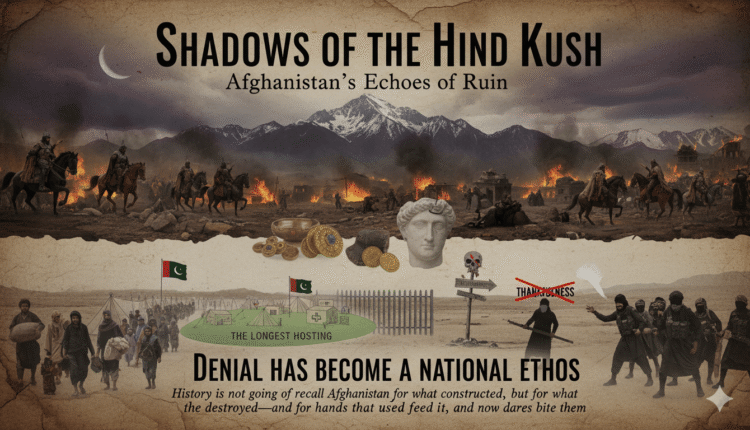
The Legend of the Warrior Nation: Afghanistan’s Protracted History of Pillage and Treachery
The tragic cycle of Afghanistan's history, from ancient raids to modern denial, and its impact on Pakistan.
By Prof. Imran Ismail Chohan
One encounters in the accounts of medieval India a persistent bad dream — the rumble of horses’ hooves on the mountain passes of the northwest. It was during winter that they first descended, clad in wool and rage, crossing over into the plains not for glory but for treasure. The affluent cities of the subcontinent, teeming with trade and culture, awoke to smoke and chaos. Towns were stormed, treasuries plundered, and what generations had accumulated by peace and prosperity were taken away. Based on The Cambridge History of India (Vol. II), these Afghan highlands’ raids in between the 10th and 18th centuries “struck terror across the plains,” resulting in northern cities being devastated and abandoned.
They never remained to govern; they arrived, pillaged, and disappeared into their desolate mountains. Unlike the cultures of Persia or India, which left a legacy of learning, architecture, and government, Afghanistan provided no legacy of progress or stability. As historian Vincent A. Smith noted, these raids were motivated “not by ambition to civilize but by the lust for plunder.” It was a land of tribal rivalries rather than a country, where concord was fleeting and treachery habitual.
Even as mighty empires invaded their inhospitable valleys — from Persians and British to Soviets and Americans — the same tale played out: fleeting resistance, internal conflict, and ultimate disintegration. Afghanistan’s survival in wars, according to the Encyclopaedia Britannica, was “less due to military victory than to ungovernable divisions and attrition.” Their so-called successes were the product not of discipline or power, but of disintegration and chaos.
But the legend of the “unconquerable warrior people” endures. A nation that constructed little still claims valor; a country that was never unified still revels in insubordination. Pride has taken the place of advancement, and denial has become a national ethos. It is simple to romanticize chaos when one has never constructed order. Their history is a monolith not of accomplishment but of devastation — a pattern of self-destruction.
And when their own conflicts left them in ruin, it was Pakistan that carried their load. Pakistan took in their refugees, schooled their youth, healed their wounded, and used its meager resources for generations. Three million Afghans, the UNHCR has noted, have made Pakistan home — the longest humanitarian hosting in history. Our schools, hospitals, and neighborhoods welcomed them when the world closed its doors.
But Pakistan is reciprocated with hostility. Smuggling, cross-border raids, and inflammatory language have taken the place of thankfulness. Their leaders hold Pakistan responsible for all their own dysfunctional system’s failures. The country that assisted them to live is now blamed by them.
Afghanistan’s tragedy has never been foreign occupation — but always internal denial. They have confused chaos with courage and survival with victory. A nation that will not learn from the past is condemned to repeat it.
Pakistan’s forbearance should no longer be confused with cowardice. Gentleness is not weakness. The world needs to cease the myth-making of heroism founded on wreckage. History is not going to recall Afghanistan for what it constructed, but for what it destroyed — and for the hands that used to feed it, and now dares to bite them.
Read More: Destabilizing South Asian Region through Proxy Wars: A Myth or Reality



Comments are closed, but trackbacks and pingbacks are open.